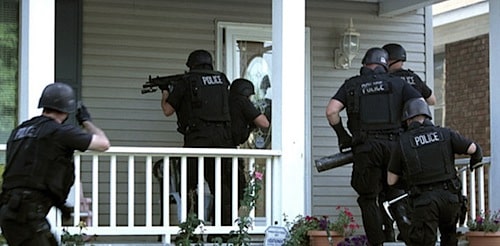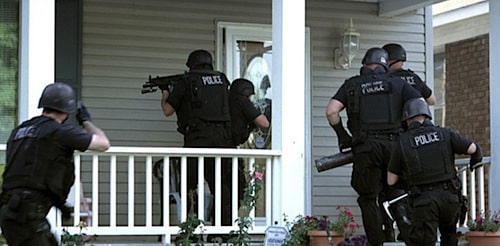Texas Lieutenant Governor Dan Patrick issued a statement Wednesday that says that, to counter “America’s negative attitude toward our law enforcement officers,” people should all-but grovel at the feet of any police they come across. Patrick even suggests that “financially able” individuals (who presumably are already paying cops’ salaries via taxes) pay for the lunches of any cops they may see in a restaurant.
Here is Patrick’s complete list of groveling suggestions:
Join me in changing this negative attitude toward those that protect us, by practicing the following:
Start calling our officers sir and ma’am all of the time. It’s a show of respect they deserve.
Every time you see an officer anywhere, let them know you appreciate their service to our community and you stand with them.
If you are financially able, when you see them in a restaurant on duty pick up their lunch check, send over a dessert, or simply stop by their table briefly and say thank you for their service.
Put their charities on your giving list.
If your local law enforcement has volunteer-citizen job opportunities, sign up.
Interestingly, Patrick never mentions in his statement that a major contributor to the negative attitude many people in Texas and across America have toward cops is the many times cops act in manners bereft of respect for the rights, property, health, and lives of the individuals they encounter.
How about the cops who abused Sandra Bland or Angel and Ashley Dobbs in Patrick’s home state? “Thank you sir. Thank you ma’am. Please, let me pay for that sandwich!”
While some people would say that these abusive cops are just a few bad apples, reading through articles by Rutherford Institute President John W. Whitehead or journalist William N. Grigg, it becomes clear that the basket contains many bad apples. The fact is that many cops are more intent on harassing, abusing, and dominating people they encounter than on serving and protecting them. Rather than disrespect for cops being, as Patrick seems to believe, some irrational, mystical belief that showed up out of nowhere, the disrespect is a logical response to the horror show of abusive cops that plays out again and again in this age of police militarization.
Though often overlooked, the war on drugs is an underlying cause of the worsening police conduct. Because the growth, manufacture, sale, transfer, and use of drugs are nonviolent and victimless activities, with no complaining victim, police have resorted to all kinds of invasive, deceptive, and destructive tactics in fighting the war. For example, the drug war has been used as an excuse for vast expansion of police practices including covert surveillance, sting operations, pretext traffic stops, asset seizures without any court hearing whatsoever, and SWAT team raids on homes and businesses. All of this is supposedly justified to protect people from themselves.
Of course, the drug war, like alcohol prohibition before it, has also spawned gangs fighting over turf. This violence, in turn, is used as an excuse for the further militarization of the police — in equipment, tactics, and mindset.
But, according to Patrick, we should be thankful for the SWAT team members who raided a home last night, pointing guns at all the suddenly awoken family members, turning the place upside down in an effort to find even a fraction of an ounce of a forbidden drug, and maybe shooting someone or the family’s pet dog to boot.
The drug war corrosion runs even deeper. Beyond the SWAT team members, there are also the undercover cops trying to snag individuals in drug sale stings, the traffic cops who make up pretenses to conduct drug searches without consent or pressure drivers to “consent” to searches, and even the desk-bound cops who handle the paperwork that allows the drug war machine to relentlessly move forward.
Patrick laments that “America’s negative attitude toward our law enforcement officers” may result in less people choosing to become cops. Yet, having less cops around can actually lead to much enhanced safety.
Let’s call off the war on drugs, its danger-enhancing police practices, and the related drug war exception to the Fourth Amendment. Let people exercise their right to grow, manufacture, sell, transfer, and use drugs as they see fit. Let the violence prohibition engenders wither. Free the drug war prisoners.
With the end of the drug war, the number of cops can be significantly reduced. Ending the war may also be the single biggest step that may be taken immediately to increase Texans’ and Americans’ respect for police.


